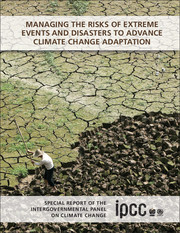 Managing the Risks of Extreme Events and Disasters to Advance Climate Change Adaptation
Managing the Risks of Extreme Events and Disasters to Advance Climate Change Adaptation Book contents
Foreword
from Section I
Published online by Cambridge University Press: 05 August 2012
Summary
This Special Report on Managing the Risks of Extreme Events and Disasters to Advance Climate Change Adaptation (SREX) has been jointly coordinated by Working Groups I (WGI) and II (WGII) of the Intergovernmental Panel on Climate Change (IPCC). The report focuses on the relationship between climate change and extreme weather and climate events, the impacts of such events, and the strategies to manage the associated risks.
The IPCC was jointly established in 1988 by the World Meteorological Organization (WMO) and the United Nations Environment Programme (UNEP), in particular to assess in a comprehensive, objective, and transparent manner all the relevant scientific, technical, and socioeconomic information to contribute in understanding the scientific basis of risk of human-induced climate change, the potential impacts, and the adaptation and mitigation options. Beginning in 1990, the IPCC has produced a series of Assessment Reports, Special Reports, Technical Papers, methodologies, and other key documents which have since become the standard references for policymakers and scientists.
This Special Report, in particular, contributes to frame the challenge of dealing with extreme weather and climate events as an issue in decisionmaking under uncertainty, analyzing response in the context of risk management. The report consists of nine chapters, covering risk management; observed and projected changes in extreme weather and climate events; exposure and vulnerability to as well as losses resulting from such events; adaptation options from the local to the international scale; the role of sustainable development in modulating risks; and insights from specific case studies.
- Type
- Chapter
- Information
- Managing the Risks of Extreme Events and Disasters to Advance Climate Change AdaptationSpecial Report of the Intergovernmental Panel on Climate Change, pp. viiiPublisher: Cambridge University PressPrint publication year: 2012
- 1
- Cited by


